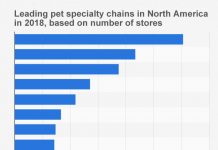The U.S. pet industry reached $86 billion in 2017 and continues to have a strong growth trajectory, according to a comprehensive new report by Packaged Facts titled U.S. Pet Market Outlook, 2018-2019.
While sales of pet products and services rose nearly 5% last year, threats of disruption keep industry players scrambling to adjust to a rapidly shifting market landscape.
From the rise of e-commerce to the role of pet-tech, here’s a look at several key trends that are reshaping the future of the pet industry.
1. E-Commerce Turns Up the Heat
Brick-and-mortar pet retailers are on the defensive as internet sales surge into the mid double digits. Shoppers are migrating online at a rapid pace, and pet food and pet supply companies can no longer afford to miss out on this fast-growing channel.
According to a Packaged Facts’ 2018 survey of U.S. pet owners, 37% of online pet shoppers agree that “I am buying pet products online more than I used to,” and 14% have made a purchase within the last seven days. With a huge selection of products available online, convenient auto-replenishment programs, and low shipping costs, it’s no surprise that pet shoppers have increasingly gravitated to internet retailers.
2. Amazon Dominates Online Sales of Pet Products
If anyone has the power to make traditional pet retailers nervous, it’s Amazon — and for good reason. Amazon boasts 65 million Prime members (and counting), a highly popular shopping app, and unique voice-shopping capabilities via the Amazon Echo. The e-commerce behemoth continues to outpace its competitors in the pet industry.
According to Packaged Facts, Amazon attracts more than half of those who purchase pet products online, surpassing Chewy.com, PetSmart.com, Petco.com, and Walmart.com by a significant margin. What’s more, Amazon is doubling down by implementing robotics innovations in its warehouses, which could give it an additional competitive advantage in the future.
3. Big-Box Pet Stores Aim to Diversify
“In the past few years, PetSmart, Petco, and Walmart have all been playing catch-up to online-based players, partly through acquisitions,” according to Packaged Facts. Last year, PetSmart snatched up Chewy.com in the biggest e-commerce acquisition yet (topping even Walmart’s $3.3 billion acquisition of Jet.com). This pattern is likely to continue, as legacy retailers buy their way into the online shopping space.
To capture some of the e-commerce market, pet specialty big box stores and mass merchandisers are also offering online ordering paired with in-store pickup. In another bid to differentiate from the pack, Petco and PetSmart are expanding their sources of revenue with more pet-care services, a space where e-commerce sites cannot compete as well, at least for the time being.
































